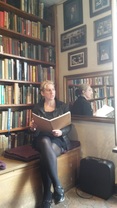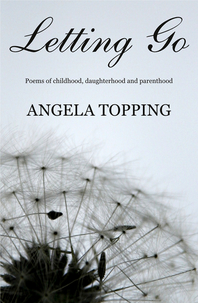|
Book Review by Maria Heath Beckett  Angela Topping has written her readers a wonderful collection of poems which touch the reader both through evoking her childhood and experiences connected with motherhood, and also by somehow triggering comparisons with our own childhood, perhaps even offering us a sense of an alternative. We grow up not really knowing how other family lives play out, day to day reality often kept behind the scenes, and the 'stage' on view to the world set with more carefully arranged furniture. Moreover, the interior side of family, the quotidian activities of baking and polishing, for example, have not always been seen as subjects of literature, so we do not always get a real picture of how other families pass their time and interact, and Topping's work is valuable, with this in mind, for her honest and detailed depictions. I have often felt certain, moreover, that parenthood merits a kind of philosophy, such are the interesting nuances of family and the interplay with society. Family, however, defies philosophy in many ways, in that core experiences often surpass logical discussion, such a the bonding of mother and baby, the grief felt on the death of a loved one, the anxiety of illness or anguished child, and it is into that space that Angela Topping steps with her wonderful poems, finding in poetry the way to explore the depths of love, separation, death and grief, and embody the values at the heart of her family life as child and then mother. Love, loyalty and shared endeavour shine through these poems, which work both as flawless crystallisation of emotional experience, and yet windows onto deep, raw sentiment. There is a skill to this method, to making the well hewn seem effortless, and Angela Topping has achieved this in her set of poems about 'Letting Go,' a fitting title given that many of the poems explore a facet of letting go, such as daughter prepared for marriage, or the death of a parent, or the sense, even on the birth of a child, that they are passing through and they are a gift but not a possession. Turning to some of the specific poems, there are many examples of real affection between the poet and her mother and father, for example, in the poem, Sitting with Dad, the comfort of the words: 'I curl up snug behind the shelter of his back, snuff the warm scent of him.' I like the way that the scenes described integrate the father into the domestic space, as we read about him baking, in the poem Pies, placing father in a kitchen setting (and this is going back a few decades) revelling in the deft 'artistry' of his work as he rolls out the pastry, 'a line of flour' on his jumper from rolling out. The alliterative description of the blackberries as 'plump with pleasure', works really well and the 'boozy juices' and 'large slices' convey an ambiance of generosity and abundance. We also see father engaged in other domestic activities such as cutting cheese and polishing, the brass polishing activity clearly a family activity fondly remembered. As a contrast we have the poem, Players Navy Cut, referring to smoking as his way of being 'carefree,' one of many poems that really seem attuned to the true natures of the loved ones described... It is striking how the family are able to embody their material world with higher values and purpose, just as the poet then imbues the details and events recalled with a kind of essence, somehow incarnating attitudes we could call spiritual, and can certainly class as spirited and deeply humane. I love the way the fluffy angora baby coat 'glows like a candle flame' (in Bildungsroman) whilst embodying tenderness: 'Mother says, "Keep it on; it's cold out." And then the discovery of mother's handbag, the jewellery box and the dresses clues that both reveal the character of her mother and lead a path between toddlerhood and adulthood, as we have a sense of Topping working out her own identity separate from family, turning 'this way and that', for example, to capture starlet poses in the looking glass. Later, the sense of distance is conveyed in the line, 'I had no TARDIS to travel back to myself.' This is just one of the losses experienced in the poem - the inevitable letting go of the person you were before, together with the world that nurtured you into the person you become - reflected on with a touching grace and acceptance, thus leaving the way open to engage with the unfolding present. The poems in Topping's collection are excellent examples of 'showing', (instead of spoon-feeding the reader with over-interpretation) and the reader has plenty of space to fill in gaps and extend from these nuggets to a wide, subtle picture of the lives portrayed. Grief, for example, suffuses later poems but is not over-stated, paying respect then to that side of emotion that is somehow felt, and physical and not easy to translate into language. There is a world beyond the one we can meaningfully express in words. Nonetheless the effort to traverse the gap between emotion and an aesthetic written parallel is without a doubt worthwhile, and I feel privileged to take part with this poet in that traversing and the beautiful poetic works to have emerged from her heartfelt, sincere endeavour. This is a collection I highly recommend, not only for lovers of poetry, but also to give out as a gift to family and friends, which would really be cherished. My copy will remain to hand in my family home, a source of comfort, solace and inspiration. Angela Topping is the auther of eight poetry collections and four pamphlets. Her work has won prizes, been set for A level and is regularly featured on Poetry Please. Her most recent collection after Letting Go (Mother's Milk Books) is The Five Petals of Elderflower (Red Squirrel Press). In 2013, she was writer in residence at Gladstone's Library.  Maria Heath Beckett was born in North Yorkshire and currently lives in London, UK. Maria has been writing for many years and is now finishing two novels and a memoir and collating her first poetry collections. Some of her writing has been published in magazines and anthologies, such as Tumbleweed Hotel Volume 1 (ed. George Whitman) and In The Company of Poets (Torriano Poets). She has recently had a narrative poem of several pages accepted for an anthology entitled, The Eternal Snow, publisher - Nirala Publications.
3 Comments
10/13/2016 08:50:26 am
I'm not really into poems but because of your book review, I want to grab a copy of this collection! I'm fond of reading especially mystery novels but it's also nice to become adventurous and try other forms of literature every once in a while. Reading makes me escape from reality every time I'm stressed over something. I'm looking forward on sharing my own thoughts about this book!
Reply
Thank you for your reply.
Reply
11/26/2016 11:44:02 am
Letting Go written by Angela Toppings is a collection of poems about childhood, daughter hood and parenthood. In the book she told that love means letting go. The poem opens a heart-door on the pluses and minuses of life, revealing the flow of time and love through the generations. Thank you for posting this book review. I've got time to read this wonderful book.
Reply
Leave a Reply. |
StrandsFiction~Poetry~Translations~Reviews~Interviews~Visual Arts Archives
April 2024
Categories |

 RSS Feed
RSS Feed